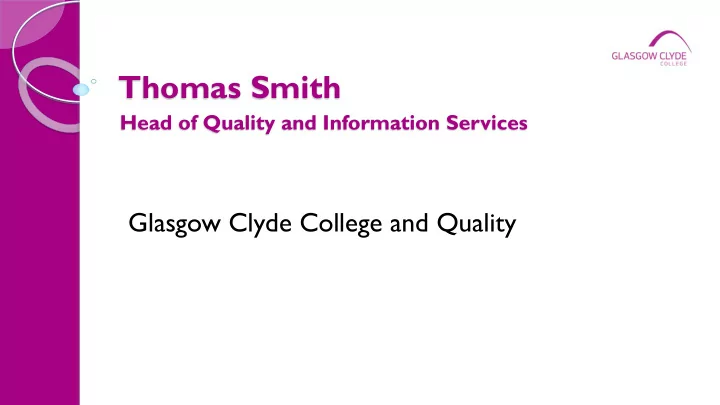

Thomas Smith Head of Quality and Information Services Glasgow Clyde College and Quality
Glasgow Clyde College - Background 3 main sites across Glasgow Serves Glasgow City & West of Scotland One of the largest FE Institutions in Scotland Formed in August 2013 (from merger of 3 Glasgow Colleges) Langside (1947) Anniesland (1964) Cardonald (1972) Over 7,000 Full-Time Students Approx. 20,000 Part-Time Students 350 Support Staff 650 Teaching staff
Portfolio and Revenue Many years of combined industrial experience Exceptional teaching standards Delivery in modern facilities Annual turnover: approx. €55m (95% Government funding; 5% Private/Commercial) 5 Faculties Faculty Example of Programme Business and Finance Computing, Accounting, Interactive Media Creative and Cultural Industrial Industries Graphic Design, Textiles, Dance, Fashion, Journalism Engineering and Built Environment Electrical Engineering, CAD, Motor Vehicle, Construction Health and Well-Being Childcare, Social Care, Stress Management Access and Continuing Learning General Education, ESOL, Skills for Life
Glasgow Clyde College Qualification Levels
Glasgow Clyde College and Quality No single Quality Framework (managed by the Director of Quality and Performance) Uses standards from a number of bodies Quality performance indicators are reviewed annually against agreed targets Trend data over 3 years is analysed and reviewed Enrolment, retention and success data is reported and evaluated Student views are gathered from surveys and through formal review meetings
Role of the Quality Department Managed by Director-level member of staff 3 Full Time members of non-teaching staff Membership of Quality and Performance Group Responsible for the College Internal Quality Cycle Manage College Complaints Procedure Manage Internal (and liaise with External) Audits
Quality and Performance Group Membership Director of Quality and Performance (Chair) Vice Principal Quality Co-Ordinator Head of Curriculum (x2) Senior Lecturer (x2) Student Representatives Remit Manage Self-Evaluation process Meet quarterly to review College interim performance Review retention Review and reflect on in-year student/staff questionnaires Output Quality action plan
Self – Evaluation Review Review each individual College found an effective annual self-evaluation process Recommendation was a quarterly self-evaluation process
The Glasgow Clyde College Quality Enhancement Strategy (2013 – 2016) ‘ Reflective and evaluative practice will be embedded through rigorous self evaluation which utilises a wide range of information and data at appropriate times through the year, identifies strengths and weaknesses, and incorporates planning for improvement. The college will ensure that all faculty and unit teams have the skills and competences to evaluate their provision and to set objectives which will result in improvement.’
Self – Evaluation Timeline Self-Evaluation Cycle begins September for the current academic year College has 3 terms (Aug – Nov, Dec – Mar, Apr – Jun) 4 formal team meetings November First draft of Self-Evaluation document containing Enrolment and Early Withdrawal analysis and previous year Quality Improvement Action Plan March Update on Equality and Diversity, Course Team Meetings, analysis of Student Questionnaire, Interim Result Analysis
Self – Evaluation Timeline (contd.) May Update of Self-Evaluation document including Innovation in Learning and Teaching, Further Withdrawal, Internal Progression and actions for Quality Improvement Action Plan August Final Self-Evaluation document including Performance Indicator Analysis, Finalised Quality Improvement Action Plan
Internal Quality Cycle Review Awarding Approval Audit Body Verification Over 20 different awarding bodies. 95% of delivery is with the Scottish Qualification Authority (SQA)
Review The numerical outcomes of assessment with additional input from lecturers are analysed to identify strengths and weaknesses Output Identify best practice for future delivery Implement quality improvement measures Continually strive to improve performance
Approval All new awards must be at least one of the following: Industry recognised University recognised entry Suitable to further students’ employability prospects The award must be fully costed with additional resources identified.
Verification (Internal) Internal Verification is the process used to ensure that we make consistent and accurate assessment decisions, in accordance with the assessment criteria defined within qualifications. Internal Verifiers are responsible for ensuring the validity of internal assessments and the reliability of assessors’ judgement. Therefore they act as ‘guarantors’ that national standards are being met. All teaching staff are also Internal Verifiers.
Audit (Internal) Audits provide: Objective evidence that the system is working A monitoring and reporting structure for the College An opportunity to improve internal processes Audit reports are submitted to College senior management
Audit (External) Awarding Body To confirm that national standards are being uniformly applied and that assessments are accurately and consistently applied across all candidates and levels. Government Evaluates the College against the three key principles of High Quality Learning Learner Engagement Quality Enhancement This process complements European VET tools such as EQARF/EQAVET and ECVET and how the SQE system is matched against the EQF.
The role of the staff in the quality system Glasgow Clyde College has a culture of quality improvement throughout the organisation. Full participation of the quality process is expected of every member of staff.
Issues Turnover of staff Change Management Maintaining standards across 3 campuses Diversity of programmes
Messages Quality Culture Self Evaluation Process is robust Student Voice is included Effective Quality Improvement Plan is implemented
Recommend
More recommend